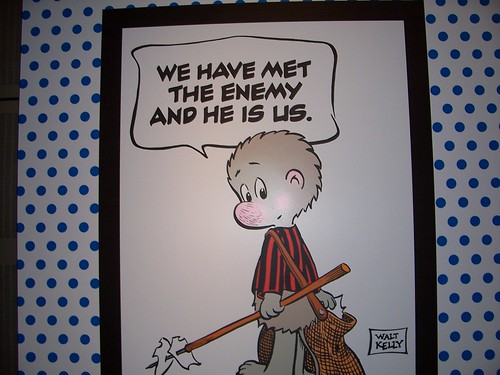The Newseum's theme, "Congress shall make no law . . . abridging the freedom of speech, or the press; or the right of the people peacebly to assemble . . ." (also known as the First Amendment), screamed from the walls of the exhibits to the front pages of the international newspapers. I have always been told the news is there to inform, but the Newseum really impressed (no pun intended) upon me the power of words. . . .
 |
| 1. Writing on the Wall |
In the book
Bass Ackwards and Belly Up, Habiba, an Ethiopian refugee, told her sister to "touch the Berlin Wall." I can see why. Unlike our response to the green/orange sectors, I did not realize the Wall caused so much desperation to escape (i.e tunnels, hot air balloon) among other emotions. Still, the Wall let news penetrate through it
. The
New York Times said that Western German T.V. was "socialism by day . . . capitalism by night."
 |
| 2. "I like to photograph kids because I still dream the way kids do." ~Walter Iooss, Sports Illustrated |
I nearly skipped Iooss's exhibit as mere "sports photgraphy," colorful action shots to convey statistics, but was surprisingly moved by the photographs of children (whether Michelle Kwan [above] or street children playing futbol in a Latin American country). They illuminated hope, a nice contrast to
some contemporary media.
 |
| 3. Pogo |
Innocent comics may be not-so-innocent, whether
Annie,
Calvin and Hobbes,
Snoopy, or even
Popeye. The focus of this frame really caught my attention and led to self-evaluation. Because we are in a World Politics UC, I then wondered, with all our connecting with, criticizing of, and aiding of other countries, how much does the U.S. look at itself from a bird's eye pov? How much do we actually focus on
domestic affairs?
 |
| 4. Katrina: Worst Hurricane in American History |
In all honesty, I had to check the date of the event: 2005. The pictures of New Orleans and victims stranded on rooftops seemed like from some other day and age . . . even some other country. Consequently, the world news saw the event as a "national disgrace." American opinion changed over time, whether sympathetic, cynic, desperate, or relieved. One of my favorite headlines: "Thank you, Jesus" (
The Commercial Appeal), because despite our secular world, some still found refuge through faith. Even more, I was inspired by the resolve of the journalists, who described the conditions as "easier . . . in Baghdad." The two
local papers that continued to run were there strictly to inform, and that is truth at its best.
 |
| 5. 9/11 Pride? |
With all the news coverage on the attack, some journalists/reporters claimed that (ironically) it was a source of pride. As "people before reporters," they were especially empathetic towards the issue, and as was their call of duty to inform the public. I am unsure whether their statement is to be commended or denounced. . . . Should not more issues be tackled with such passion? In any case, the display of the national/international newspapers was overwhelming. Besides the Trade Towers antenna, however, I was a bit disappointed by the exhibit . . . until I saw the video. In fourth grade, one does not undertand the signifcance of 9/11 other than 1) My teacher stopped teaching us English to run out to the teacher's lounge and watch the news 2) I couldn't play soccer that evening because of some plane crash all the way in New York and 3) My mom was crying because my dad was in the Air Force. Yet, the TV images were so powerful . . . it is amazing I watched the whole thing. It really made me think about cause-
effect, too: How much would we, as a nation, be different today if 9/11 did not happen? Was it inevitable? Was it necessary? And of course, the age old question, "Could it have been prevented?"





No comments:
Post a Comment